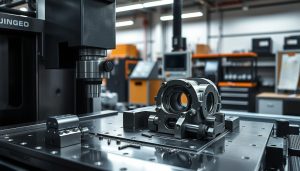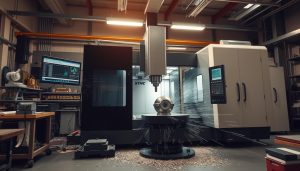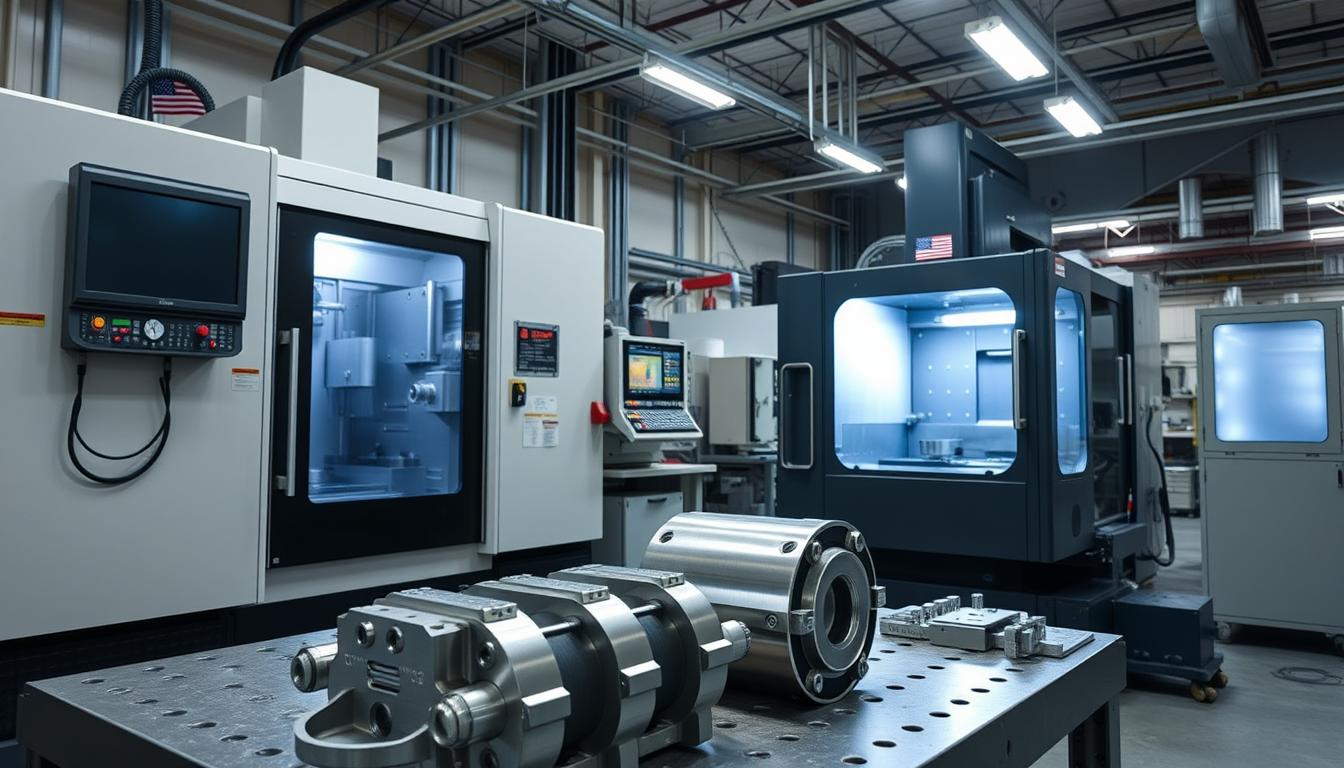
Precision CNC Machining Services in the USA
Precision CNC Machining Services in the USA offer a range of cutting-edge processes. They produce high-precision parts for different industries. Industries like aerospace, automotive, and medical devices benefit from these services. CNC technologies in America stand out for their accuracy and speed. Since 1980, companies such as The Federal Group USA and Panek Precision have led. They’ve continuously adapted to meet the changing needs of production12. Services utilize 3-axis, 4-axis, or advanced 5-axis milling machines. This ensures quick project completion, boosting productivity while maintaining quality1.
Key Takeaways
- Precision CNC machining supports diverse industries including automotive, aerospace, and medical devices.
- Technologically advanced 3-axis, 4-axis, and 5-axis milling machines are crucial for high-precision manufacturing.
- Leading companies like The Federal Group USA and Panek Precision set industry standards in CNC services America.
- Reduction in turnaround times enhances efficiency and productivity for businesses.
- CNC machining services in the USA ensure high accuracy and reliability.
Introduction to Precision CNC Machining Services
CNC stands for Computer Numerical Control. It’s at the heart of today’s manufacturing world. It uses computers to direct tools like lathes, mills, and routers. With CNC, industries like aerospace, automotive, and healthcare see high efficiency and consistency3.
Back in the 1960s, CNC machining changed how factories worked. Now, it’s key in the USA, creating items from airplane engines to medical tools4. It helps quickly change designs and make new prototypes, speeding up how fast things can be made without losing quality5.
CNC machines can work all day and night. This makes making things more productive and cost-effective5. They reach tight tolerances and make surfaces look great. So, products are made with high precision5. CNC has made zero mistakes a goal, lowered waste, and kept workers safer by reducing their contact with dangerous tools5.
Many different CNC tools, like mills, lathes, cutters, and printers, are crucial for making detailed parts. Mills shape parts as needed, while lathes work on round items3. New tools and software let CNC do complex jobs and adjust easily to what customers need4.
CNC keeps getting better, helping engineers evaluate and tweak designs with CAE software. This lets them meet standards for performance and safety3. Learning the basics of CNC helps us see how much it’s changed making things today.
Advantages of Precision CNC Machining
Precision CNC machining brings huge benefits that boost how things are made. Let’s look at the main gains:
Improved Workflow and Reduced Turnaround Times
CNC machining stands out because it works all day and night without stopping6. This keeps things moving swiftly and cuts down wait times. So, companies can stick to tight schedules and make more products. Also, it speeds up work, making the making process smoother and reducing hanging around6.
High Precision and Accuracy
Being super accurate is a big win for precision CNC machining6. CNC machines can be accurate up to 0.004 mm. This is key for making parts perfectly that have to meet strict quality rules6. Exactly right for fields like aerospace and medical, where tiny mistakes can cause big problems7. Thanks to precise computer instructions, CNC machines deliver exact and consistent results, cutting down human mistakes and achieving close tolerances7.
Cost-Effective Solutions
Saving money while maintaining quality is essential, and precision CNC machining does just that7. It cuts down making costs by being efficient, accurate, and using fewer materials than traditional methods7. Fewer errors and higher production rates mean lower operational costs6. Plus, CNC machines hardly need maintenance. Just swapping cutting tools and simple cleaning add to the savings6.
In short, CNC machining brings major advantages. It makes processes smoother, assures top-notch accuracy, and offers cost-saving manufacturing solutions.
CNC Machining Services: Types and Capabilities
CNC machining services offer different types, each with special capabilities. Understanding these differences helps businesses choose the right machine.
3-Axis Milling Machines
The 3-axis CNC milling machine is the starting point, working on x, y, and z axes. It’s great for sharp edges, precise holes, and clear slots. The cost for these machines ranges from $10,000 to $200,000, based on their complexity.
The hourly operating cost begins at about $408. These machines are key in industries focused on manual milling tasks.
4-Axis Milling Machines
A step up, 4-axis milling machines add a rotary axis for more detailed machining. This fourth axis allows for complex shapes and detailed parts. It’s perfect for projects needing intricate designs.
Their advanced computing power manages this complexity with precision9.
5-Axis Milling Machines
For top precision and complexity, 5-axis CNC milling machines are unmatched. They add two rotational axes for advanced shapes and faster cycles. This capability is vital for high-end projects like aerospace parts.
The investment and hourly costs for these machines are higher8. They offer the best in complex machining in one setup.
Using 3-axis, 4-axis, and 5-axis CNC machines, businesses get the most precise tools. Modern CNC systems’ vast computing power and flexibility boost production accuracy9.
Industries Benefiting from Precision CNC Machining
Precision CNC machining is a game changer in many industries. It meets the high product standards and detailed needs of different fields. This includes aerospace, medical, and car industries. Their need for perfect accuracy and high precision is why CNC machining is so important.
Aerospace and Aircraft
The aerospace industry depends a lot on CNC machining. It makes important parts like air-foil and air-tuning systems. These parts must be very precise, with tolerances close to ±0.0001 inches. This precision keeps aircraft safe and performing well10.
Thanks to CNC machining, creating CAD drawings and starting production is faster. This speed is crucial for aerospace projects to meet their deadlines11. CNC machining ensures all products are of the highest quality. This meets the aerospace industry’s strict requirements12.
Medical, Dental, and Orthopedic
In the health care field, CNC machining is vital. It’s used for making detailed medical devices. These include orthopedic implants and surgical tools. The technology can achieve incredible precision, up to 0.00004 inches11.
It’s also great for making a lot of products quickly without losing quality. This matters a lot for making medical devices12. Precise and specially made parts mean devices work well. This helps patients heal successfully10.
Automotive Industry
The car industry has greatly benefited from automotive CNC solutions. It’s used for fast prototyping and making new tech. CNC machining is key for making precise car parts like pistons and valves12.
This technology means car makers can introduce new tech quickly. They can also make changes easily, staying ahead in the market. This leads to less time spent on development and better quality products. In the end, car companies save money and make more profit10.
Materials Used in CNC Machining
CNC machining materials are key in manufacturing, offering flexibility and efficiency. They can handle a diverse set of materials. This meets different needs across various sectors.
Metals
High-strength metals like stainless steel, aluminum, titanium, copper, and brass are used in metal CNC machining. Stainless steel kinds, such as 304, 316, 416, and 17-4 PH, are chosen for their great corrosion resistance and mechanical strength13. Aluminum is loved for being easy to machine, light, and strong against corrosion, perfect for aerospace and cars13.
Titanium is as sturdy as steel but lighter, making it good for medical and aerospace uses13. Copper is sought after for its great electrical and thermal conductivity, useful in electronics13. Brass is preferred for its machining ease and resistance to rust13.
Plastics and Composites
Plastic CNC uses materials like HDPE, Nylon, PEEK, and Polycarbonate. They offer unique benefits like resisting chemicals, wear, and heat13. High heat affects these materials differently; for example, PVC works up to 176°F14. Some, like polyisocyanurate, don’t melt even at extreme heats14.
Choosing materials for CNC machining means looking at traits like tensile strength and endurance14. It’s crucial to know how they perform at high temperatures to prevent damage14. Rules from bodies like the FDA might also guide material selection for certain uses14.
For lighter, weight-sensitive projects, PEEK is a solid yet costly choice14. Materials must be picked based on the environment; for instance, resistance to rust and moisture is key for outdoor use14. The level of tolerance needed can influence cost and the chance of success, with tighter tolerances usually raising the price14.
| Material | Properties | Applications |
|---|---|---|
| Stainless Steel 304 | Corrosion resistance, strength | Automotive, medical devices |
| Aluminum | Lightweight, corrosion resistance | Aerospace, consumer electronics |
| Titanium | High strength-to-weight ratio | Aerospace, medical implants |
| Copper | Excellent electrical and thermal conductivity | Electronics, HVAC components |
| PEEK | High strength, chemical resistance | Industrial, automotive |
The Top CNC Machining Companies in the USA
The USA boasts some of the world’s leading CNC machining companies. These companies, like Protolabs, are famous for their top-notch machining services. Protolabs set the bar high with rapid prototyping and cutting-edge manufacturing techniques15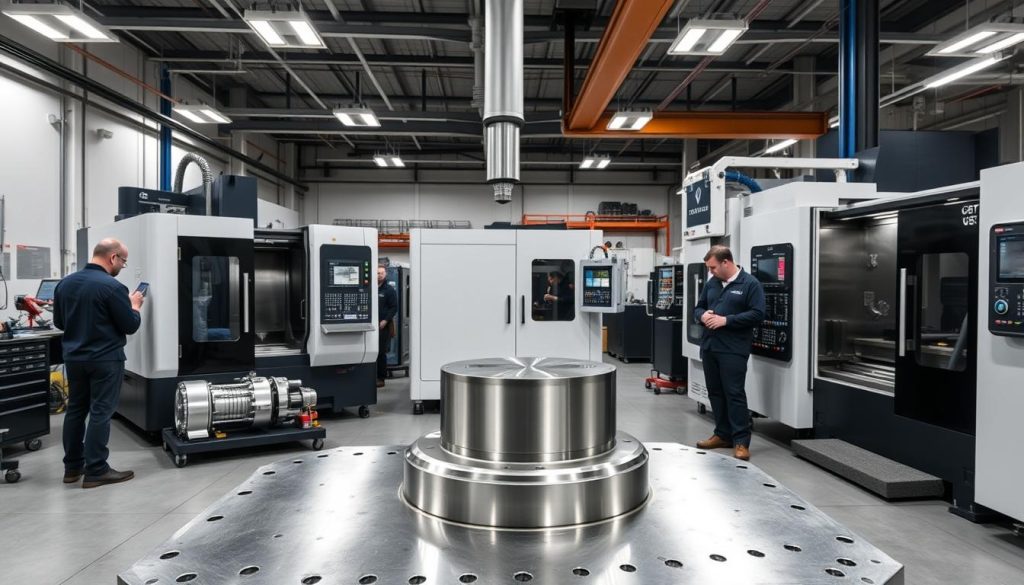 . Founded in 1999, Protolabs has broadened its offerings, including 3D printing. This shows how it evolves to embrace new technologies.
. Founded in 1999, Protolabs has broadened its offerings, including 3D printing. This shows how it evolves to embrace new technologies.
TDL Mould has been delivering high-precision CNC machining solutions since 1995. They are prized for their fast prototype production, taking only 3-4 working days15. Titan America MFG, started in 2005, excels in rapid prototyping and high-speed CNC machining. They provide a wide array of services to meet varied client needs15.
BDE Manufacturing Technologies, known for precision machining, started in 1995 too15. Fictiv, launched in 2013, is celebrated for its digital manufacturing platform. This platform makes getting custom parts cheaper and easier15.
| Company | Established | Services Provided |
|---|---|---|
| Protolabs | 1999 | Rapid Prototyping, 3D Printing, CNC Machining |
| TDL Mould | 1995 | High-Precision CNC Machining, Prototyping |
| Titan America MFG | 2005 | Rapid Prototyping, High-Speed CNC Machining |
| BDE Manufacturing Technologies | 1995 | Precision Machining, Engineering Support |
| Fictiv | 2013 | Digital Manufacturing, Custom Parts |
Yijin Hardware Co., Ltd. has been serving for 20 years. It caters to sectors like aviation and automotive16. TFG, in Ferndale since 1980, ensures the best mix of price, quality, and delivery. They specialize in precision CNC metal parts16. Empire Group focuses on industries like aerospace and defense. They prioritize quality and customer happiness16.
Family-owned CNC Machining, Inc. operates 23 CNC machining centers. They specialize in hard materials like titanium16. Metal Tech Company, known for precision metal stampings, serves the automotive and electronics industries16. FM Machine Co., running since 1963, offers detailed machining and assembling in a large facility16. Pacific CNC Machine Co. focuses on full production machining and assembly. Quality and on-time delivery are their hallmarks16.
Technical Specifications and Tolerances in CNC Machining
In many fields, having precise CNC machining tolerances is vital. These tolerances show how accurate a part must be and are shown with numbers and a ± sign. The expected surface smoothness is different for flat and curved surfaces. For the former, it’s 63 µ in., while for the latter, it’s 125 µ in17. CNC machines can reach an incredible accuracy of up to +/-0.0025mm18.
It’s key to know different CNC standards and specs to make parts just right. Tolerances come in various types like bilateral, GD&T, unilateral, and limit tolerances18. Many CNC shops stick to common tolerances for standard parts, usually around +/-0.1mm, unless the customer asks for something specific18. For example, flatness must be within ±0.005 in. (0.127mm), and cylindricity should also stay within +/- 0.005 in. (0.127mm)17. These rules make sure parts are accurate and dependable.
Tolerances and Standards
Tolerances and standards are core in CNC machining for accurate size and good performance. High precision projects need strict CNC standards. Often, common parts are made with a tolerance of ±0.1mm. Yet, for crucial uses like aerospace or medical devices, much tighter CNC machining tolerances are needed. This might require special measuring tools18.
Geometry Limitations
Knowing what shapes are hard to make is crucial in CNC machining. Some shapes can be tough for CNC machines, changing how well the final part turns out. Details like knife edges, deep holes, or very thin walls can make machining harder. This can affect how well parts work. Understanding these limits helps in designing parts that can be made well and work well.
| Characteristic | Specification |
|---|---|
| Surface Roughness for Flat Surfaces | 63 µ in. |
| Surface Roughness for Curved Surfaces | 125 µ in. |
| Standard Tolerance for Flatness | ±0.005 in. (0.127mm) |
| Cylindricity Tolerance | ±0.005 in. (0.127mm) |
| Typical CNC Tolerance | ±0.1mm |
Quality Assurance in CNC Machining
In the competitive manufacturing world, high stringent quality assurance in CNC machining is key. It’s vital for making parts accurately and consistently, so they work right19. Tiny errors can cause big problems, including safety risks and costly recalls. This highlights why being precise is critical19.
Inspection and Certifications
Quality assurance means following strict standards like ISO 9001 and AS9100 in machining shops20. By doing both in-process inspections and final quality checks, we make sure every part meets its specific requirements. Certificates like the Certificate of Conformance (CoC), First Article Inspections (FAIs), and material certifications prove our parts are top-quality and follow strict rules20. Sticking to these standards ensures our methods meet both industry and customer expectations.
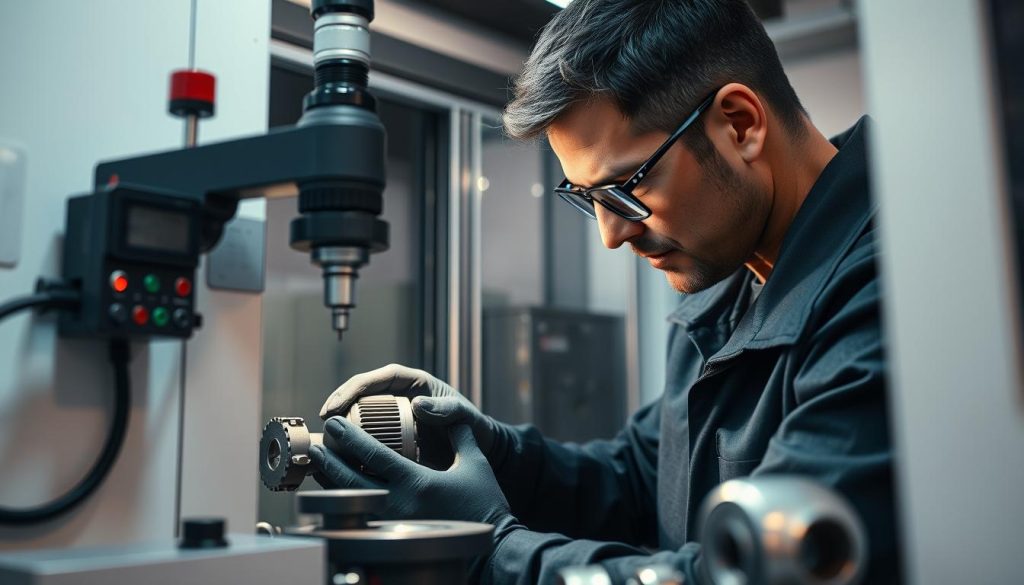
Quality Control Measures
To make top-notch products consistently, systematic quality control is essential19. We use strategies to reduce waste, like using standard part sizes and recycling scraps19. By keeping a close eye on quality, we can also cut down on unexpected machine breakdowns. This helps us prevent delays19.
Our experts use advanced equipment like height gages and microscopes to meet customer needs20. These tools track how machines are doing, find any changes, and check if we’re hitting our goals. This helps us spot problems before they happen19. High-quality CNC work not only boosts our reputation but also keeps our customers happy. It lowers the risk of defects and ensures we deliver what’s promised, every time.
Post-Processing and Finishing Options
After making CNC parts, various steps are taken to make them look better, work better, or last longer. These steps are key to ensure the parts meet the high standards of many industries.
Surface Finishing Techniques
CNC surface finishing makes parts look nicer and protects them from corrosion and wear. For plastic and metals, options include keeping tool marks visible which costs $21. Metals can also have a light bead blast finish at a higher cost. For sharp finishes with tool marks, the cost is $21 again. If you need quick coating, anodizing in black or clear, or hardcoat in black are offered, with prices varying based on the choice21.
For enhanced finishing, you can choose from bead blast, electroless nickel, or powder coating among others. Part marking and silk screening are also available21.
Threading Options
CNC threading improves CNC parts’ function. There are many threading choices like standard, metric, and special threads21. These options help pieces fit specific requirements and industries’ needs.
Precision CNC machining is popular in many fields due to its exactness and ability to make light parts. In aerospace, it’s used for making specific components22. The automotive industry uses it for prototyping and creating parts like gearboxes and interior fittings22. The medical field depends on it for creating parts for devices and metal implants22.
Choosing a CNC Machining Service Provider
Choosing the right CNC service is important. You must look at several things to find a good CNC partner. First, check if the company has modern technology and has been around for years. It’s key they have a solid setup and a team committed to quality CNC work23. Also, they should keep learning new things in the field to offer better service23.
Another key point is how quickly they can do the job. Long wait times can slow down your work and lead to losses. It’s crucial that they work fast23. For example, some firms like 3E Rapid Prototyping guarantee to finish jobs in just 3 days24. This speed can really help keep your projects on track.
Quality is super important too. Your CNC partner must double-check their work to avoid mistakes and meet your requirements23. Look for certifications like ISO 9001 to be sure they have good quality control24.
A good CNC service should offer different things like milling and drilling. Being able to adjust to what you need is key for quick results and meeting demands23. Clear and direct communication is also essential for a smooth partnership24.
Where the provider is located matters a lot. Choosing someone nearby can lower shipping time and costs, making sure parts arrive when needed23. Looking at what other customers say online can also tell you a lot about their reliability24.
Last, the ability to handle more work in the future and offer rapid prototyping is crucial. Being able to grow and improve keeps efficiency and quality up24. This is especially important in sectors like aerospace where precision and strict quality checks are a must23.
Conclusion
Our journey into precision CNC machining in the USA shows it’s reshaping industries. We explored how CNC machining boosts workflow, brings unmatched accuracy, and offers cost-saving solutions. Recognizing the types of CNC machines and the sectors they support helps us see their wide use and flexibility.
The CNC machining field is evolving, allowing industries to use various materials, like metals and composites. This meets specific needs. Companies like Worthy Hardware are at the forefront, making CNC machining more impactful and within reach25. For many businesses, outsourcing is key. It leads to savings, and cuts down on space and training costs26.
Looking ahead, CNC machining is set to become even more refined and integral to manufacturing. This promises better product quality and more efficiency. To stay ahead, companies should embrace these changes. This positions them as leaders in an ever-changing industrial world.
